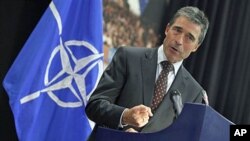The U.N. Security Council has voted unanimously to end the authorization of the NATO no-fly zone over Libya, which was established in March to protect civilians from forces loyal to then-dictator Moammar Gadhafi. The vote was held despite a request from Libya’s interim government to delay the action.
The new resolution terminates as of Monday, October 31 at 23:59 Libyan local time, the authorization in resolution 1973 allowing “all necessary measures” to protect Libyan civilians.
The earlier resolution also was agreed to unanimously by the council, but later, several members, including Russia, India and South Africa expressed concern that some countries were going beyond the mandate in enforcing it. They have since used it as their rationale for not supporting strong action on Syria or Yemen, where there also are violent anti-government crackdowns happening.
U.S. Ambassador Susan Rice said all 15 council members knew exactly what they were authorizing during the negotiations on resolution 1973.
“We described thoroughly that this would entail active use of air power and air strikes to halt Gadhafi forces that were engaged in offensive actions against its people," she said. "There was no question that the members of the Security Council knew what they were voting for. Now, undoubtedly as this unfolded and occurred over the course of some months, there were those that found increasingly uncomfortable what it was they had agreed to. But to suggest somehow that they were misled is false.” .
In addition to terminating the no-fly zone, the new resolution drafted by Russia and Britain also expresses concerns about the proliferation of arms in Libya, reports of reprisal attacks, arbitrary detentions, and extra-judicial killings.
It also welcomes some positive developments, however, saying the council looks forward to the swift establishment of an inclusive, representative transitional government that respects the human rights and the fundamental freedoms of the Libyan people.
The resolution does not lift the arms embargo or other sanctions on Libya that were imposed earlier this year to deter Gadhafi from violence against his people.
France was one of the countries at the forefront of the move seven months ago to get resolution 1973 adopted. Ambassador Gérard Araud welcomed the new resolution, saying it is the completion of a sequence that culminated in Libya’s declaration of liberation on October 23.
"It is a very important stage which is finishing today, which was basically the liberation of Libya with the support of all the countries which wanted to be part of this magnificent endeavor,” said Araud.
On Wednesday, Libya’s deputy U.N. Ambassador Ibrahim Dabbashi asked the council to delay the vote for a few days, saying his government needed time to assess the security situation and its capacity to monitor its borders. But the council ignored his call to wait for a formal request from the National Transitional Council before taking action.
The Security Council will consider next a Russian-drafted resolution expressing concern about the proliferation of weapons in Libya and beyond its borders. Diplomats say the measure could be adopted this week.
UN Security Council Ends NATO Mission in Libya




